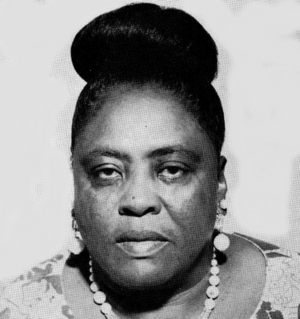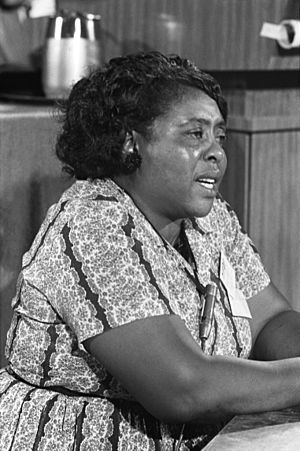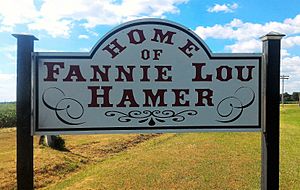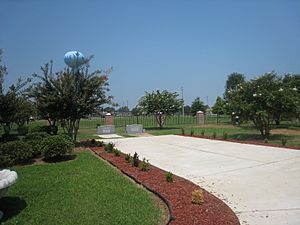Fannie Lou Hamer facts for kids
Quick facts for kids
Fannie Lou Hamer
|
|
|---|---|

Hamer in 1971
|
|
| Born |
Fannie Lou Townsend
October 6, 1917 |
| Died | March 14, 1977 (aged 59) Mound Bayou, Mississippi, U.S.
|
| Burial place | Ruleville, Mississippi, U.S. |
| Organization | National Women's Political Caucus Student Nonviolent Coordinating Committee National Council of Negro Women |
| Known for | Civil rights leader |
| Title | Vice chairwoman of Freedom Democratic Party; Co-founder of National Women's Political Caucus |
| Political party | Freedom Democratic Party |
| Movement | Civil rights movement Women's rights |
| Spouse(s) | Perry "Pap" Hamer |
| Children | 4 |
| Awards | Inductee of the National Women's Hall of Fame |
Fannie Lou Hamer (born Townsend; October 6, 1917 – March 14, 1977) was an American leader in the civil rights movement. She worked hard to help people get the right to vote. She also fought for women's rights. Fannie Lou Hamer was a community organizer, meaning she helped bring people together to solve problems in their neighborhoods.
She was the vice-chair of the Freedom Democratic Party. This group worked to give African Americans a voice in politics. Hamer also helped organize Mississippi's Freedom Summer. This was a big effort to register black voters. She also helped start the National Women's Political Caucus. This group helps women of all backgrounds run for government jobs.
Hamer started her civil rights work in 1962. She continued until her health declined. She was known for using spiritual songs and powerful quotes. She showed great strength in leading the fight for black women's rights in Mississippi. She faced many dangers while trying to register to vote. People tried to stop her, but she never gave up. She helped thousands of African Americans in Mississippi register to vote. She also helped many people in need through programs like the Freedom Farm Cooperative.
She ran for the U.S. Senate in 1964 and the Mississippi State Senate in 1971, but she did not win. In 1970, she took legal action against the government of Sunflower County, Mississippi. This was because they continued to keep people apart based on race.
Hamer passed away on March 14, 1977, at age 59. Her memorial service was attended by many people. Andrew Young, who was the U.S. Ambassador to the United Nations, spoke at her service. In 1993, she was honored by being added to the National Women's Hall of Fame.
Contents
Her Early Life
Fannie Lou Townsend was born on October 6, 1917. She was the youngest of 20 children. Her family lived in Montgomery County, Mississippi. When she was young, her family's farm animals were mysteriously poisoned. She believed a local racist person did it.
In 1919, her family moved to Sunflower County, Mississippi. They worked as sharecroppers on a large farm. From age six, Fannie picked cotton with her family. During the winters, she went to a one-room school for sharecroppers' children. She loved reading and was good at spelling and reciting poetry. But at age 12, she had to leave school to help her parents. By age 13, she picked hundreds of pounds of cotton daily. She also lived with polio, a disease that can affect muscles.
Fannie continued to learn by studying the Bible at her church. Later, people admired how she connected Bible stories to the fight for civil rights. In 1944, the farm owner found out she could read and write. He chose her to keep track of time and records on the farm. The next year, she married Perry "Pap" Hamer. He was a tractor driver on the same farm. They stayed there for 18 more years.
Fannie and Perry Hamer did not have their own children. They later adopted four girls. One of their adopted daughters, Dorothy Jean, died young. She was denied hospital care because of her mother's activism.
Hamer became interested in the civil rights movement in the 1950s. She heard leaders speak at yearly meetings in Mound Bayou, Mississippi. These meetings discussed voting rights and other issues for black communities.
Fighting for Civil Rights
Facing Challenges to Vote
On August 31, 1962, Hamer and 17 other people tried to vote. But they failed a literacy test. This meant they were not allowed to vote. Her boss fired her from her job. Her husband had to stay on the farm until the harvest ended. Fannie Lou Hamer moved between friends' homes for safety. On September 10, people shot at the house where she was staying. No one was hurt.
The next day, Hamer and her family left town for three months. They feared attacks from the Ku Klux Klan because she tried to vote. On December 4, she returned home. She went to the courthouse to take the literacy test again. She failed and was turned away. Hamer told the person in charge, "You'll see me every 30 days till I pass."
Joining the Movement
On January 10, 1963, Hamer took the literacy test a third time. She passed and became a registered voter in Mississippi. But when she tried to vote that fall, she found another problem. Her county also required voters to have two poll tax receipts. These taxes and literacy tests were used to stop black people and Native Americans from voting. Hamer later paid for and got the tax receipts.
After these events, Hamer became more involved with the Student Nonviolent Coordinating Committee (SNCC). She attended many meetings and workshops. She traveled to get signatures for petitions. These petitions asked for federal help for poor black families. In early 1963, she became a SNCC field secretary. She helped people register to vote and get welfare aid. Many people she helped faced the same problems she did when trying to register.
The Freedom Democratic Party
In 1964, Hamer helped start the Mississippi Freedom Democratic Party (MFDP). This party aimed to stop the all-white Democratic Party from silencing African-American voices. It wanted a party that stood for all people and fought against unfair treatment. After the MFDP started, Hamer and other activists went to the 1964 Democratic National Convention. They wanted to be the official representatives from Mississippi.
Hamer's powerful speech was shown on TV. President Lyndon B. Johnson tried to interrupt it. But most news channels showed her speech later that night. This gave Hamer and the MFDP a lot of attention.
Senator Hubert Humphrey offered a deal. He said the Freedom Democratic Party could have two seats. He also said the convention would be fairer in 1968. The MFDP said no to the deal. Hamer famously said, "We didn't come all the way up here to compromise for no more than we'd gotten here. We didn't come all this way for no two seats when all of us is tired." After this, all the white members from the Mississippi group walked out.
In 1968, the MFDP finally got seats. The Democratic Party changed its rules to demand equal representation from all states. In 1972, Hamer was chosen as a national party delegate.
A Powerful Voice
Fannie Lou Hamer traveled across the country. She spoke at many colleges and other places. She was not rich, and her clothes and way of speaking showed it. She was a short, strong black woman with a deep southern accent. Some people made fun of her because she did not have a formal education. For example, some activists called her "ignorant." President Lyndon B. Johnson also looked down on her.
When Hamer was considered to speak at the 1964 Democratic National Convention, Hubert Humphrey said, "The President will not allow that illiterate woman to speak from the floor of the convention." In 1964, Hamer received an honorary degree from Tougaloo College. Some educated black people were upset. They thought she did not deserve it because she was "unlettered."
However, Hamer had many supporters. People like Ella Baker and Malcolm X believed in her story and her ability to speak. They felt that people who had struggled and survived in places like Mississippi had learned important things. Hamer was known for making people feel strong emotions during her speeches. She had a way of "telling it like it is."
Hamer's speaking style came from her childhood and her family's black Baptist Church. She spoke with confidence, Bible knowledge, and even humor. This was surprising to many, since she lacked formal education. Hamer saw her mother bravely protect her children from white landowners. Her mother also taught her to be proud of being black. Her father was a Baptist preacher who told jokes. Even though Hamer only went to school until sixth grade, she was excellent at reading, spelling, and poetry. Her family encouraged her to recite poetry for them and their guests.
Hamer became a timekeeper on the plantation. This job made her the main person who talked to both the white landowners and the black sharecroppers. This helped her learn to talk to different kinds of people. When she joined the Civil Rights Movement in the early 1960s, her speaking skills quickly became clear. Activists were amazed that she did not write her speeches. She spoke them from memory.
Reverend Edwin King said Hamer was a great cook. She would choose the perfect spices for her guests. He said, "after she became the orator, she began picking and choosing the spicy parts she’d put in her speeches." When she traveled, Hamer not only gave speeches but also sang. She often sang with The Freedom Singers. Charles Neblitt, a member of the group, said she put her whole self into her singing. He said her singing showed her dedication, struggle, pain, and hope.
Hamer's unique way of speaking showed the experiences of black Southerners. It showed how they were often denied access to standard American English. One of Hamer's most famous speeches was in Harlem on December 20, 1964. She spoke with Malcolm X. In her speech, "Sick and Tired of Being Sick and Tired," Hamer talked about the violence she faced when trying to register to vote. She also connected the struggles in the South to the oppression black people faced all over the country.
Helping Her Community
In 1964, Hamer ran for the U.S. Senate but did not win. She continued to work on other projects. These included local Head Start programs for young children. She also helped with Martin Luther King, Jr.'s Poor People's Campaign. With help from others, she published her autobiography in 1967. She said she was "tired of all this beating" and "there's so much hate. Only God has kept the Negro sane."
Hamer wanted equality in all parts of society. She believed African Americans were not truly free if they did not have the same chances as white people. This included opportunities in farming. Sharecropping was a common way for black people to work and earn money after slavery. Hamer wanted black people to be independent. She wanted to give them a voice through farming.
James Eastland, a white senator, tried to keep African Americans from voting and being equal. He had a lot of power in farming. Hamer disagreed with this. In 1969, she started the Freedom Farm Cooperative (FFC). This was an effort to share economic power and help African Americans become financially strong. Hamer also worked with the National Council of Negro Women (NCNW). They started "The Pig Project" to provide food for people who could not afford meat.
Hamer made it her goal to make land more available to African Americans. She started a small "pig bank." The NCNW gave her five male pigs and fifty female pigs to start. A family could care for a pregnant pig until it had babies. Then they would raise the piglets for food and to sell. Within five years, thousands of pigs were available. Hamer used the success of the pig bank to raise money for the main farming group. She convinced a student from Harvard to write an article asking for donations.
The FFC raised about $8,000. This allowed Hamer to buy 40 acres of land. This land became the Freedom Farm. The farm had three main goals: to provide food for people in need, to offer good housing development, and to help new businesses and train people with limited education.
Over time, the FFC offered other services. These included financial counseling, a scholarship fund, and a housing agency. The FFC helped 35 struggling black families get subsidized houses. Hamer's success inspired others. The FFC ended in 1975 because it ran out of money.
In 1971, Hamer helped start the National Women's Political Caucus. She believed women could be powerful if they voted together, no matter their race. She said, "A white mother is no different from a black mother. The only thing is they haven't had as many problems. But we cry the same tears."
Her Legacy Lives On
Fannie Lou Hamer died on March 14, 1977, at age 59. She had health problems from hypertension and breast cancer. She was buried in her hometown of Ruleville, Mississippi. Her tombstone has one of her famous quotes: "I am sick and tired of being sick and tired."
Her main memorial service was held in a church and was completely full. Another service was held at Ruleville Central High School. Over 1,500 people attended. Andrew Young, the U.S. Ambassador to the United Nations, spoke at the service. He said, "None of us would be where we are now had she not been there then."
Famous Words from Fannie Lou Hamer
- "Nobody's free until everybody's free."
- "I feel sorry for anybody that could let hate wrap them up. Ain't no such thing as I can hate anybody and hope to see God's face."
- "If I fall, I'll fall five feet four inches forward in the fight for freedom. I'm not backing off."
- "One day, I know the struggle will change. There's got to be a change - not only for Mississippi, not only for the people in the United States, but people all over the world."
Awards and Recognition
Hamer received many awards during her life and after she passed away. She received a special law degree from Shaw University. She also received honorary degrees from Columbia College Chicago in 1970 and Howard University in 1972. In 1993, she was added to the National Women's Hall of Fame.
Hamer also received the Paul Robeson Award and the Mary Church Terrell Award. She is an honorary member of the Delta Sigma Theta sorority. On October 6, 2017, the 100th anniversary of her birth, a remembrance for her was given in the U.S. House of Representatives.
Remembering Fannie Lou Hamer
In 1970, Ruleville Central High School held a "Fannie Lou Hamer Day." Six years later, the City of Ruleville itself celebrated a "Fannie Lou Hamer Day." In 1977, musicians Gil Scott-Heron and Brian Jackson wrote a song called "95 South (All of the Places We've Been)" to honor Hamer.
In 1994, the Ruleville post office was named the Fannie Lou Hamer Post Office. The Fannie Lou Hamer National Institute on Citizenship and Democracy was started in 1997. It offered summer programs and workshops. In 2014, it joined with another center to become the Fannie Lou Hamer Institute @ COFO. This center provides a research library and educational programs. There is also a Fannie Lou Hamer Public Library in Jackson.
A music collection by Wadada Leo Smith in 2012 included a piece called "Fannie Lou Hamer and the Mississippi Freedom Democratic Party, 1964." A picture book about Hamer's life, Voice of Freedom: Fannie Lou Hamer, Spirit of the Civil Rights Movement, won an award. Hamer is also one of 28 civil rights heroes shown on the Freedom Wall in Buffalo, New York. A quote from her 1964 speech is carved on a granite column at the Civil Rights Garden in Atlantic City.
Fannie Lou Hamer Freedom High School was created in the Bronx, New York. It focuses on humanities and social justice. In 2017, the Fannie Lou Hamer Black Resource Center opened at the University of California at Berkeley.
In 2018, the Mississippi Democratic Party's main fundraiser was renamed the Hamer-Winter Dinner. This honored Hamer and former governor William Winter. The 2019 Women's March in Atlantic City was dedicated to Hamer's life and legacy.
Her Books and Music
- Fannie Lou Hamer, Julius Lester, and Mary Varela, Praise Our Bridges: An Autobiography, 1967
- Hamer, Smithsonian Folkways Recordings, Songs My Mother Taught Me (album), 2015
- Hamer (2011). The Speeches of Fannie Lou Hamer: To Tell It Like It Is. University Press of Mississippi. ISBN: 9781604738230.
See also
 In Spanish: Fannie Lou Hamer para niños
In Spanish: Fannie Lou Hamer para niños




